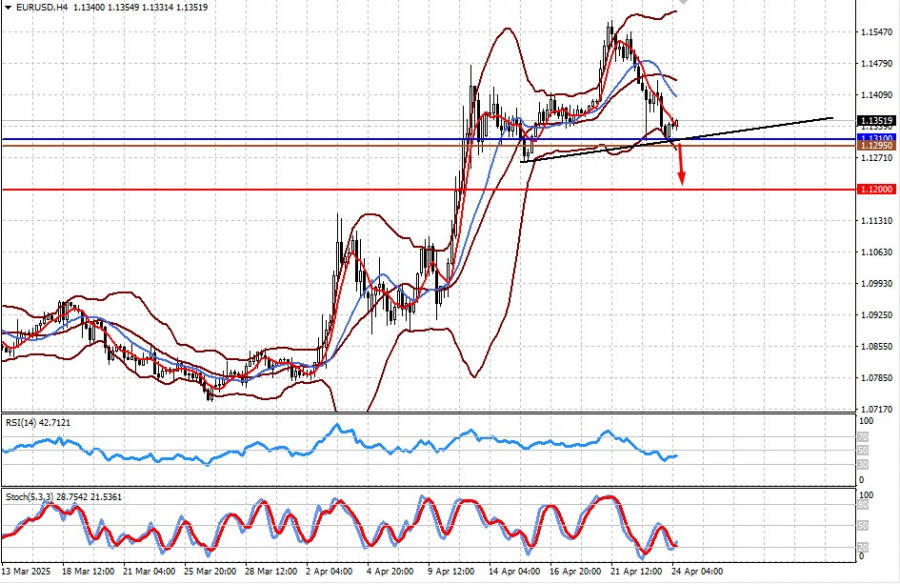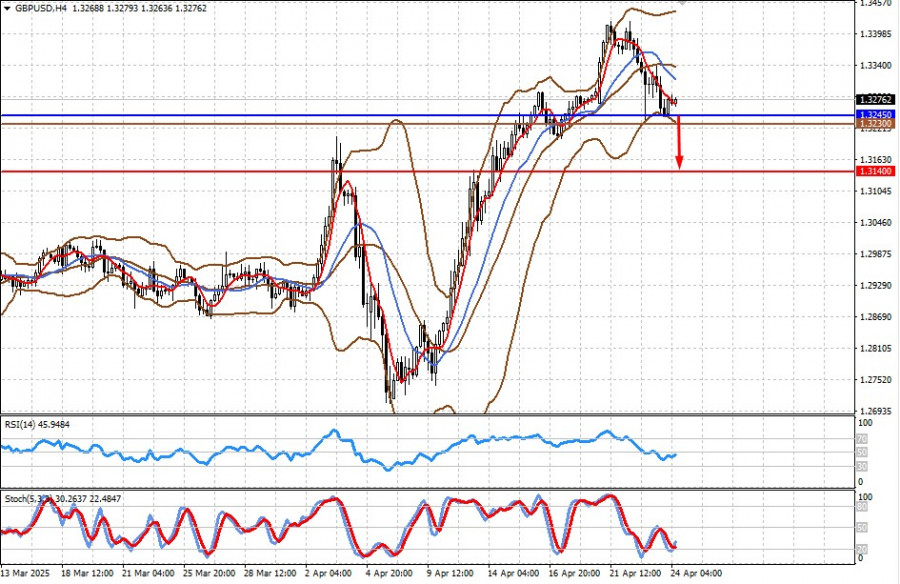See also


 24.04.2025 09:38 AM
24.04.2025 09:38 AMWhile markets remain focused on trade wars, particularly between the U.S. and China, incoming economic data indicate persistent structural problems in the advanced economies of Europe and the United States.
Markets enthusiastically reacted with a two-day rally following comments by U.S. Treasury Secretary Scott Bessent, who expressed hope for easing trade tensions between Washington and Beijing and assurances from Donald Trump that he had no plans to remove Jerome Powell from his post as Federal Reserve Chair. Now, all attention is shifting to key economic reports, which are pointing to a further plunge of the European economy into a state of depression and local challenges in the U.S.
Starting with Europe, the PMI reports for manufacturing and services in leading eurozone countries—France and Germany—as well as the composite reading for the eurozone all signal a continued slowdown. This confirms the entrenched negative trend for continental Europe, which can no longer be described merely as a "recession" but as a full-fledged depression. European elites are attempting to counter this through a strategy of military-industrial mobilization.
Even though the United Kingdom is outside the EU, it is also experiencing serious economic difficulties, as recent PMI data confirm.
What about the U.S.?
The situation there has improved somewhat. The Services PMI for April declined to 51.4 from 54.4 (the forecast was 52.8). While this is a slowdown, it's not yet catastrophic—the indicator remains above the 50-point mark that separates expansion from contraction. In manufacturing, the PMI rose slightly to 50.7 from 50.2, avoiding the expected drop to 49.0.
The U.S. housing market also remains relatively stable. New home sales in March increased to 724,000 compared to 674,000 previously, beating the forecast of 684,000.
Overall, the data from Europe and the U.S. show a relatively stronger position for the American economy. However, it's worth noting that the reports still don't fully reflect the impact of Trump's tariff wars, especially against China.
While investors try to focus on macroeconomic indicators, trade tensions remain the central narrative and will continue to dominate investor decision-making.
Looking at the broader picture of U.S.-China rivalry, it seems likely that the world's two largest economies will eventually have to compromise. Unless something extreme happens—like another unexpected move by Trump to pressure China with new sanctions—markets may already have passed their bottom and could begin to recover.
The pair has recently surged on the back of dollar weakness, fueled by recession fears and speculation about Powell's potential removal. However, if the dollar stabilizes and the interest rate spread between the ECB and the Fed shifts against the euro, a renewed decline in EUR/USD is possible. A drop below 1.1310 would open the way toward 1.1200. A suitable sell level could be around 1.1295.
The situation is similar to EUR/USD. The pound has mirrored the euro's movement. A decline below 1.3245 could push the pair toward 1.3140. A suitable sell level could be around 1.3230.
You have already liked this post today
*The market analysis posted here is meant to increase your awareness, but not to give instructions to make a trade.
The upcoming week will be rich in important economic data releases, which could have a noticeable impact on market dynamics — but will they be able to? Amid the geopolitical
The upcoming week's economic calendar is packed with important releases. As usual, the beginning of a new month brings significant macroeconomic reports from the U.S. and the Eurozone, typically triggering
No macroeconomic events are scheduled for Monday. If the market barely reacted to macroeconomic data last week, there is nothing to expect on Monday. Of course, Donald Trump could make
InstaTrade in figures

Your IP address shows that you are currently located in the USA. If you are a resident of the United States, you are prohibited from using the services of InstaFintech Group including online trading, online transfers, deposit/withdrawal of funds, etc.
If you think you are seeing this message by mistake and your location is not the US, kindly proceed to the website. Otherwise, you must leave the website in order to comply with government restrictions.
Why does your IP address show your location as the USA?
Please confirm whether you are a US resident or not by clicking the relevant button below. If you choose the wrong option, being a US resident, you will not be able to open an account with InstaTrade anyway.
We are sorry for any inconvenience caused by this message.


